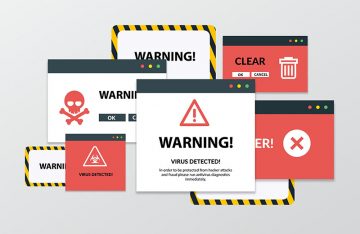'Critical Error IP Threat Detected' Pop-Up Scam

Upon investigation, it has been determined that "Critical Error IP Threat Detected" is, in fact, a technical support scam. It operates under the guise of "Microsoft Support," with the intention of deceiving users into contacting fake technicians by issuing false warnings about non-existent threats and issues on their devices.
It is crucial to emphasize that this scam has no affiliation whatsoever with Windows or its developer, Microsoft Corporation. Websites hosting the "Critical Error IP Threat Detected" scam mimic the official Microsoft site. When visitors access these sites, they are presented with a counterfeit system scan and numerous pop-up warnings regarding fictitious threats. Throughout the scam, visitors are prompted to reach out to "Microsoft Support."
Technical support scams typically promote fraudulent helplines, and the way they proceed when a victim contacts the scammers can vary widely. The scam may unfold entirely during the phone call(s), during which the caller is duped into divulging sensitive information, conducting financial transactions, visiting malicious websites, or downloading/installing malware like trojans, ransomware, or cryptominers.
In many instances, tech support scammers request remote access to the victims' computers, often using legitimate software like UltraViewer, TeamViewer, or AnyDesk. While connected, cybercriminals can inflict significant damage. They maintain the pretense of being "support" or "expert technicians" throughout the process. This diversion allows scammers to disable or remove security tools, install fake antivirus programs, extract sensitive data, and even introduce actual malware onto the victim's device.
Cybercriminals employ various methods to obtain information, including tricking users into revealing it over the phone, presenting them with phishing websites or files camouflaged as sign-in pages or registration forms, or using data-stealing malware. The information they seek includes login credentials (e.g., email, social media, e-commerce, online banking, cryptocurrency wallets), personally identifiable details, and financial data (e.g., bank account details, credit card numbers).
Additionally, scammers often charge exorbitant fees for their "services" and prefer difficult-to-trace methods for receiving payments, such as cryptocurrencies, prepaid vouchers, gift cards, or concealed cash in packages sent via mail. What's more, victims who have fallen for such scams are frequently targeted repeatedly.
In summary, trusting a scam like "Critical Error IP Threat Detected" can result in system infections, severe privacy breaches, financial losses, and even identity theft.
If you find it impossible to close a deceptive webpage, terminate the browser's process using Windows Task Manager. If you have granted scammers remote access to your device, disconnect it from the internet, uninstall the remote access program they used, and perform a full system scan with antivirus software to eliminate any identified threats.
What Are the Typical Signs of a Tech Support Scam?
Tech support scams can be deceptive and harmful, so it's essential to recognize the common signs of such scams to protect yourself from falling victim. Here are typical signs of a tech support scam:
- Unexpected Pop-Up Messages: A sudden, alarming pop-up message on your computer or web browser claiming to be from a reputable tech company like Microsoft, Apple, or Google is a red flag. These pop-ups typically warn of virus infections, security breaches, or system errors.
- Cold Calls: Receiving unsolicited phone calls from someone claiming to be a tech support agent from a well-known company is a strong sign of a scam. Legitimate tech companies don't make unsolicited calls to customers.
- Scare Tactics: Tech support scammers often use scare tactics to create urgency and fear. They may claim that your computer is infected with a dangerous virus, your accounts are compromised, or your data is at risk.
- Request for Remote Access: Scammers may ask for remote access to your computer, claiming they need to diagnose and fix the problem. Granting this access can be highly risky, as they can compromise your system or steal your data.
- Unsolicited Emails: Receiving unexpected emails with warnings about your computer's security or system issues, along with contact details for "tech support," is a potential sign of a scam.
- Unprofessional or Poor Grammar: Scam messages, pop-ups, or websites often contain spelling and grammar errors. Legitimate tech companies maintain professional communication.
- Unexpected Charges: Scammers may request payment for their supposed services or insist on purchasing unnecessary software or services.
- Asking for Personal or Financial Information: Legitimate tech support agents won't ask for sensitive information like passwords or credit card details. Scammers, on the other hand, may seek to steal this data.
- Pressure to Act Quickly: Tech support scammers often create a sense of urgency, pressuring you to make decisions immediately. They may claim that delaying could lead to severe consequences.








